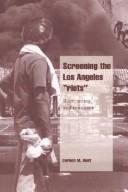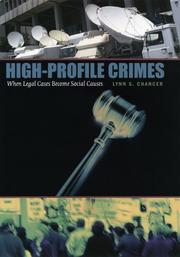| Listing 1 - 5 of 5 |
Sort by
|
Book
ISBN: 0674245830 0674245857 0674976363 Year: 2020 Publisher: Cambridge, MA : Harvard University Press,
Abstract | Keywords | Export | Availability | Bookmark
 Loading...
Loading...Choose an application
- Reference Manager
- EndNote
- RefWorks (Direct export to RefWorks)
How gangsta rap shocked America, made millions, and pulled back the curtain on an urban crisis. How is it that gangsta rap—so dystopian that it struck aspiring Brooklyn rapper and future superstar Jay-Z as “over the top”—was born in Los Angeles, the home of Hollywood, surf, and sun? In the Reagan era, hip-hop was understood to be the music of the inner city and, with rare exception, of New York. Rap was considered the poetry of the street, and it was thought to breed in close quarters, the product of dilapidated tenements, crime-infested housing projects, and graffiti-covered subway cars. To many in the industry, LA was certainly not hard-edged and urban enough to generate authentic hip-hop; a new brand of black rebel music could never come from La-La Land. But it did. In To Live and Defy in LA, Felicia Viator tells the story of the young black men who built gangsta rap and changed LA and the world. She takes readers into South Central, Compton, Long Beach, and Watts two decades after the long hot summer of 1965. This was the world of crack cocaine, street gangs, and Daryl Gates, and it was the environment in which rappers such as Ice Cube, Dr. Dre, and Eazy-E came of age. By the end of the 1980s, these self-styled “ghetto reporters” had fought their way onto the nation’s radio and TV stations and thus into America’s consciousness, mocking law-and-order crusaders, exposing police brutality, outraging both feminists and traditionalists with their often retrograde treatment of sex and gender, and demanding that America confront an urban crisis too often ignored.
Urban youth --- Gangsta rap (Music) --- Inner cities --- History and criticism. --- Social aspects --- 1992 Riots. --- Batterram. --- Gangsta Rap. --- Gangster rap. --- L.A. Riots. --- L.A.P.D. --- Long Beach Riot. --- Los Angeles Hip-Hop. --- Most Dangerous Group. --- N.W.A. --- Priority Records. --- Reality Rap. --- Rodney King. --- Ruthless Records. --- Straight Outta Compton. --- West Coast Rap.
Book
ISBN: 0674259963 0674259971 0674988191 Year: 2021 Publisher: Cambridge, Massachusetts : Harvard University Press,
Abstract | Keywords | Export | Availability | Bookmark
 Loading...
Loading...Choose an application
- Reference Manager
- EndNote
- RefWorks (Direct export to RefWorks)
"When Sorrow Comes explores the sermons that American clergy, primarily Protestant ministers, gave in the first weeks after national crises, beginning with Pearl Harbor. Additional chapters include the sermons given after the assassinations of John F. Kennedy and Martin Luther King Jr.; those given after the Oklahoma City bombing and the LA "Race Riots"; a chapter on the sermons given in the immediate aftermath of September 11, 2001; and a final chapter on the killing of Trayvon Martin and the Newtown School Shooting. The book focuses on three broad analytic questions: How do the sermons understand the tragedy and recommend that listeners process their grief? What assumptions inform the clergy's narratives of the relation between church and state during the crisis? What are the meanings ascribed to being both a Christian and a citizen during each emergency?"--
Church and state --- Topical preaching --- Religion and civil society --- Crisis management --- History --- Religious aspects --- Christianity. --- American political identity. --- Antigone. --- JFK assassination. --- MLK assassination. --- Newtown School Shooting. --- Oklahoma Bombing. --- Pearl Harbor. --- Rodney King uprising. --- Sermons. --- Trayvon Martin. --- church/state. --- civil society. --- mourning. --- preaching. --- pulpit.

ISBN: 9780521570879 9780511628160 9780521578141 0521570875 0521578140 0511628161 0511822545 Year: 1997 Publisher: Cambridge Cambridge University Press
Abstract | Keywords | Export | Availability | Bookmark
 Loading...
Loading...Choose an application
- Reference Manager
- EndNote
- RefWorks (Direct export to RefWorks)
On April 29 1992, the 'worst riots of the century' (Los Angeles Times) erupted. Television news-workers tried frantically to keep up with what was happening on the streets while, around the city, nation and globe, viewers watched intently as leaders, participants and fires flashed across their television screens. Screening the Los Angeles 'Riots' zeros in on the first night of these events, exploring in detail the meanings one news organisation found in them, as well as those made by fifteen groups of viewers in the events' aftermath. Combining ethnographic and quasi-experimental methods, Darnell M. Hunt's account reveals how race shapes both television's construction of news and viewers' understandings of it. He engages with the long-standing debates about the power of television to shape our thoughts versus our ability to resist, and concludes with implications for progressive change.
Race relations and the press --- Television broadcasting of news --- 316.774.16 --- 323.1 <73> --- Television broadcasting --- Television coverage of news --- Television journalism --- Television news --- Broadcast journalism --- Press and race relations --- Race problems and the press --- Press --- 323.1 <73> Nationale bewegingen. Nationalisme. Rassenpolitiek--Verenigde Staten van Amerika. VSA. USA --- Nationale bewegingen. Nationalisme. Rassenpolitiek--Verenigde Staten van Amerika. VSA. USA --- 316.774.16 Massamedia: maatschappelijk, politiek, ideologisch, ethisch, juridisch, socio-cultureel--(communicatiesociologie) --- Massamedia: maatschappelijk, politiek, ideologisch, ethisch, juridisch, socio-cultureel--(communicatiesociologie) --- News --- Sociology of minorities --- Social problems --- Mass communications --- Los Angeles --- Los Angeles [California] --- Social Sciences --- Sociology --- Rodney King Riots, Los Angeles, Calif., 1992 --- King Rebellion, Los Angeles, Calif., 1992 --- King Riots, Los Angeles, Calif., 1992 --- Los Angeles Civil Disturbance, Los Angeles, Calif., 1992 --- Los Angeles Riots, Los Angeles, Calif., 1992 --- Rodney King Rebellion, Los Angeles, Calif., 1992 --- South Central Riots, Los Angeles, Calif. 1992 --- Race riots --- Press coverage.
Book
ISBN: 9798887191683 9798887191669 Year: 2023 Publisher: Boston, MA
Abstract | Keywords | Export | Availability | Bookmark
 Loading...
Loading...Choose an application
- Reference Manager
- EndNote
- RefWorks (Direct export to RefWorks)
This is the story of Zev Yaroslavsky, a young social activist, who became one of Los Angeles' most powerful and consequential elected officials, taking on established power brokers and sparking major reforms in policing, transit, land use and fiscal policies. "I may be a part of the establishment," he said when first sworn into office, "but the establishment is not part of me.".

ISBN: 1282537490 9786612537493 0226101134 9780226101132 9780226101125 0226101126 0226101126 9781282537491 6612537493 Year: 2005 Publisher: Chicago University of Chicago Press
Abstract | Keywords | Export | Availability | Bookmark
 Loading...
Loading...Choose an application
- Reference Manager
- EndNote
- RefWorks (Direct export to RefWorks)
O. J. Simpson. The Central Park jogger. Bensonhurst. William Kennedy Smith. Rodney King. These are more than crimes and criminals, more than court cases. They are cultural events that, for better or worse, gave concrete expression to latent social conflicts in American society. In High-Profile Crimes, Lynn Chancer explores how these cases became conflated with larger social causes on a collective level and how this phenomenon has affected the law, the media, and social movements. An astute and incisive chronicle of some of the most polarizing cases of the 1980s and 1990s, High-Profile Crimes shows that their landmark status results from the overlapping interaction of diverse participants. The merging of legal cases and social causes, Chancer argues, has wrought ambivalent effects on both social movements and the law. On the one hand, high-profile crimes offer important opportunities for emotional expression and raise awareness of social issues. But on the other hand, social problems cannot be resolved through the either/or determinations that are the goals of the legal system, creating frustration for those who look to the outcome of these cases for social progress. Guilt or innocence through the lens of the media leads to either defeat or victory for a social cause-a confounding situation that made the O. J. Simpson case, for example, unable to resolve the issues of domestic violence and police racism that it had come to symbolize. Based on nearly two hundred interviews, Chancer's discussions of the infamous Central Park jogger and Bensonhurst cases-as well as the rape trials of William Kennedy Smith and Mike Tyson, the assault cases of Rodney King and Reginald Denny, and, finally, the O. J. Simpson murder trial-provide a convincing, multidimensional and innovative analysis of the most charged public dramas of the last two decades.
Crime --- Trials --- Crime and the press --- Crime in mass media. --- Mass media and public opinion --- Crime and criminals in mass media --- Mass media --- State trials --- Court proceedings --- Procedure (Law) --- City crime --- Crime and criminals --- Crimes --- Delinquency --- Felonies --- Misdemeanors --- Urban crime --- Social problems --- Criminal justice, Administration of --- Criminal law --- Criminals --- Criminology --- Transgression (Ethics) --- Sociological aspects. --- Public opinion. --- Social aspects --- criminal, crime, legal, law, litigation, justice, enforcement, police, sociology, anthropology, case, courtroom, judge, activism, oj simpson, central park, bensonhurst, william kennedy smith, rodney king, well known, famous, culture, cultural, america, american, controversial, news, 1980s, 1990s, high profile, racism, domestic violence, interviews, rape, trial, jury, journalistic.
| Listing 1 - 5 of 5 |
Sort by
|

 Search
Search Feedback
Feedback About UniCat
About UniCat  Help
Help News
News